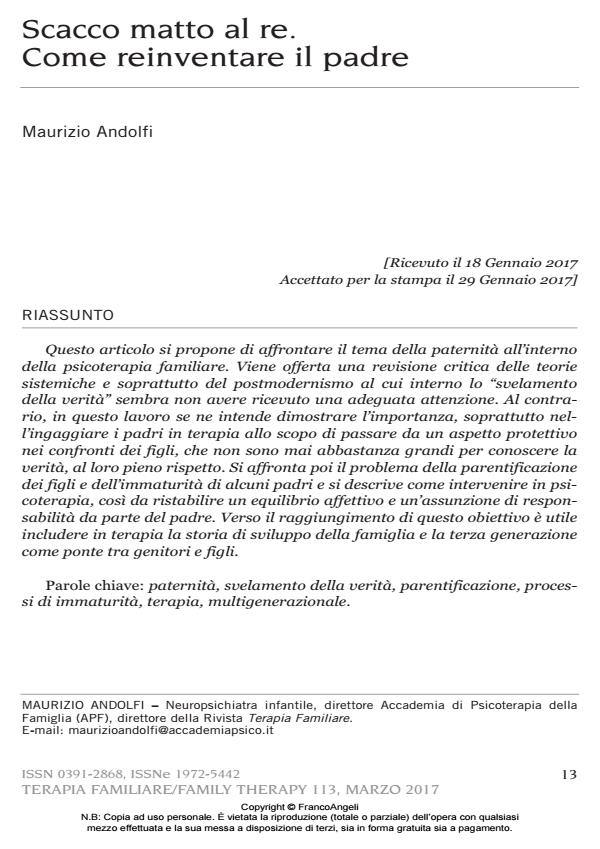Scacco matto al re. Come reinventare il padre
Titolo Rivista TERAPIA FAMILIARE. Rivista interdisciplinare di ricerca ed intervento relazionale
Autori/Curatori Maurizio Andolfi
Anno di pubblicazione 2017 Fascicolo 2017/113
Lingua Italiano Numero pagine 26 P. 13-38 Dimensione file 157 KB
DOI 10.3280/TF2017-113002
Il DOI è il codice a barre della proprietà intellettuale: per saperne di più
clicca qui
Qui sotto puoi vedere in anteprima la prima pagina di questo articolo.
Se questo articolo ti interessa, lo puoi acquistare (e scaricare in formato pdf) seguendo le facili indicazioni per acquistare il download credit. Acquista Download Credits per scaricare questo Articolo in formato PDF

FrancoAngeli è membro della Publishers International Linking Association, Inc (PILA)associazione indipendente e non profit per facilitare (attraverso i servizi tecnologici implementati da CrossRef.org) l’accesso degli studiosi ai contenuti digitali nelle pubblicazioni professionali e scientifiche
Questo articolo si propone di affrontare il tema della paternità all’interno della psicoterapia familiare. Viene offerta una revisione critica delle teorie sistemiche e soprattutto del postmodernismo al cui interno lo "svelamento della verità" sembra non avere ricevuto una adeguata attenzione. Al contrario, in questo lavoro se ne intende dimostrare l’importanza, soprattutto nell’ingaggiare i padri in terapia allo scopo di passare da un aspetto protettivo nei confronti dei figli, che non sono mai abbastanza grandi per conoscere la verità, al loro pieno rispetto. Si affronta poi il problema della parentificazione dei figli e dell’immaturità di alcuni padri e si descrive come intervenire in psicoterapia, così da ristabilire un equilibrio affettivo e un’assunzione di responsabilità da parte del padre. Verso il raggiungimento di questo obiettivo è utile includere in terapia la storia di sviluppo della famiglia e la terza generazione come ponte tra genitori e figli.
Parole chiave:Paternità, svelamento della verità, parentificazione, processi di immaturità, terapia, multigenerazionale.
- Disturbo oppositivo provocatorio: dalla diagnosi al trattamento in un'ottica sistemico relazionale Caterina Nardis, Costanza Giordani, Michela Quintaiè, Giulia Meneghetti, Grazia Armenia, in TERAPIA FAMILIARE 138/2025 pp.19
DOI: 10.3280/TF2025-138003
Maurizio Andolfi, Scacco matto al re. Come reinventare il padre in "TERAPIA FAMILIARE. Rivista interdisciplinare di ricerca ed intervento relazionale" 113/2017, pp 13-38, DOI: 10.3280/TF2017-113002